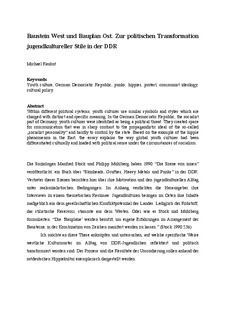| dc.contributor.author | Rauhut, Michael | |
| dc.date.accessioned | 2013-04-05T07:49:02Z | |
| dc.date.available | 2013-04-05T07:49:02Z | |
| dc.date.issued | 2012 | |
| dc.identifier.citation | Rauhut, M. (2012). Baustein West und Bauplan Ost. Zur politischen Transformation jugendkultureller Stile in der DDR. Norsk tidsskrift for musikkforskning, 2013, 1-9. http://journal.uia.no/index.php/NTM/article/view/63 | no_NO |
| dc.identifier.issn | 1893-8671 | |
| dc.identifier.uri | http://hdl.handle.net/11250/138578 | |
| dc.description | Published version of an article from the journal: Norsk tidsskrift for musikkforskning. Also freely available oon the Internet:http://journal.uia.no/index.php/NTM/article/view/63 | no_NO |
| dc.description.abstract | Within different political systems, youth cultures use similar symbols and styles which are
charged with distinct and specific meaning. In the German Democratic Republic, the socialist
part of Germany, youth cultures were identified as being a political threat. They created space
for communication that was in sharp contrast to the propagandistic ideal of the so-called
„socialist personality“ and hardly to control by the state. Based on the example of the hippie
phenomenon in the East, the essay explains the way global youth cultures had been
differentiated culturally and loaded with political sense under the circumstances of socialism | no_NO |
| dc.language.iso | ger | no_NO |
| dc.publisher | Universitet i Agder / University of Agder | no_NO |
| dc.title | Baustein West und Bauplan Ost. Zur politischen Transformation jugendkultureller Stile in der DDR | no_NO |
| dc.type | Journal article | no_NO |
| dc.type | Peer reviewed | no_NO |
| dc.subject.nsi | VDP::Humanities: 000::Musicology: 110::Music history: 111 | no_NO |
| dc.source.pagenumber | 1-9 | no_NO |
| dc.source.volume | 1 | no_NO |
| dc.source.journal | Norsk tidsskrift for musikkforskning | no_NO |
| dc.source.issue | 1 | no_NO |
